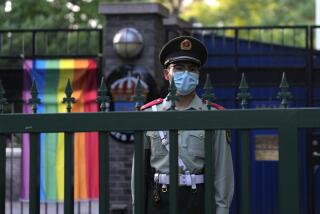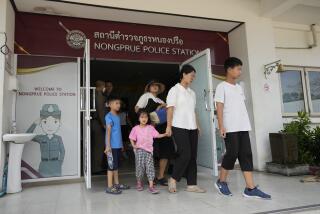Hong Kong Bars Falun Gong Followers During Jiang Visit
- Share via
HONG KONG — A nervous Hong Kong government barred entry Tuesday to scores of followers of the Falun Gong spiritual movement, seeking to diminish tensions during President Jiang Zemin’s brief visit to the territory.
A spokeswoman for Falun Gong condemned the move as kowtowing to Beijing, while human rights groups called the territorial government’s action arbitrary and undemocratic.
“This is wholly inappropriate,” said Jan van der Made, a representative here for Human Rights Watch. “These people are no threat to the Hong Kong government, and they’ve committed no crime of any kind. You don’t expect something like this to happen in a place that calls itself a free city.”
Falun Gong, which is based on traditional Chinese beliefs and philosophy, has been branded an “evil cult” by Beijing authorities. It has been banned on the Chinese mainland since July 1999 but remains legal in Hong Kong, which enjoys a degree of autonomy under the terms of the British colony’s return to Chinese sovereignty nearly four years ago.
Falun Gong supporters claim that more than 200 followers have been tortured to death on the mainland in recent years, and they blame Jiang for the campaign against them.
Jiang has been known to harbor a strong dislike for the movement since April 1999, when 10,000 Falun Gong supporters staged a surprise demonstration outside the government’s main residential compound in Beijing.
Hong Kong government leaders have ordered the largest security operation since the territory was transferred back to China, mainly to ensure that Jiang is shielded from demonstrators during his three-day visit.
Falun Gong spokeswoman Sophie Xiao said that during the last 10 days about 100 supporters--including about 40 on Tuesday--had been detained at the territory’s international airport and deported after trying to enter Hong Kong. Another 170 practitioners of the movement were allowed to enter, she said. She accused Immigration Department officials of working from an unofficial blacklist to identify members.
Xiao said the names of most of those refused entry were either well known within the group or had appeared at some point on the movement’s Internet site, while those allowed entry had virtually no public profile. Seven Americans were among those deported, she said, while 55 were Taiwanese.
A spokeswoman for the U.S. Consulate in Hong Kong, Barbara Zigli, expressed concern about immigration procedures that she said “were apparently used arbitrarily to deny entry to some American citizens.”
She added that such action could affect freedom of association and restrict the free flow of ideas in the city. “It is also important to Hong Kong’s success as an international city that it remain open to the traveling public,” she said.
An official from Hong Kong’s Immigration Department declined to comment in any detail on the deportations but denied that entry was refused solely because a traveler was a Falun Gong follower.
“If a person is rejected, it is because they have not fulfilled the norms,” spokesman Sunny Ho said. He declined to discuss what norms had not been fulfilled.
During the first day of Jiang’s visit, police reported only a few small protests and a brief clash with demonstrators. Four people from a local political action group were arrested after scuffling with police, who seized a mock coffin they were carrying that bore Jiang’s name.
In one of the day’s biggest demonstrations, about 250 Falun Gong supporters gathered Tuesday evening for a silent candlelight vigil about half a mile from the Hong Kong Convention and Exhibition Center, where Jiang, former President Clinton and other prominent political figures were meeting with business leaders at a conference on Asia’s economic future.
At a keynote speech Tuesday evening held under extremely tight security, Jiang told the business leaders that China will continue to open its markets to foreign trade and investment.
“According to a preliminary estimate, from 2001 to 2005, China will import $1.4 trillion worth of equipment, products and technology,” he said. “We welcome more overseas investment.”
More to Read
Sign up for Essential California
The most important California stories and recommendations in your inbox every morning.
You may occasionally receive promotional content from the Los Angeles Times.













